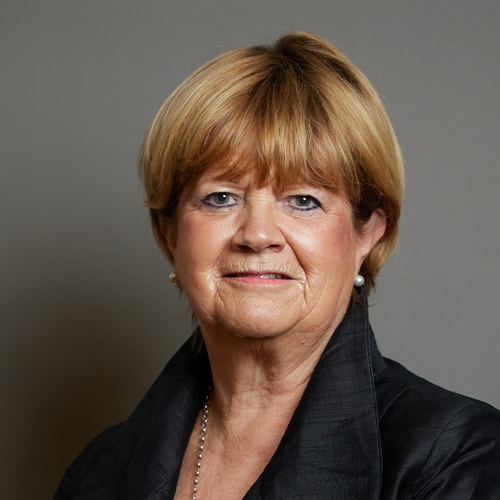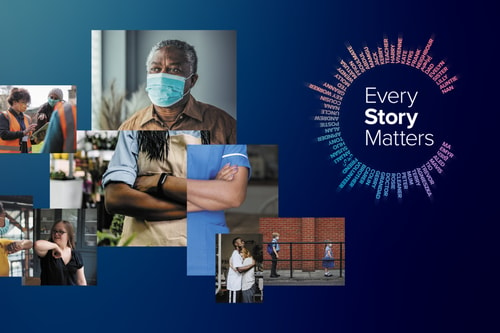Last month, the Evangelical Alliance advocacy team met with the UK Covid-19 Public Inquiry team. They were interested to learn more about the different ways in which Evangelical Alliance members supported their communities during the pandemic, and are keen for our members to engage with their ‘Every Story Matters’ campaign.
Since February, you will have seen high-profile politicians such as Matt Hancock, David Cameron, and others being questioned on the first theme of the Public Inquiry, ‘resilience and preparedness’. But the Inquiry continues into the next stages, examining a wide range of themes around the UK’s response and the impact of the pandemic, in order to learn lessons for the future. Now, in their new ‘Every Story Matters’ campaign, the Inquiry team is inviting the public to share their experience of how the pandemic affected them, whether directly or indirectly – and they are keen to hear from Evangelical Alliance members,
Why evangelicals need to engage with the Inquiry
Covid-19 affected us all, but it impacted some groups in society disproportionately.
Through news coverage and publications, we now know that those living in deprivation, those from ethnic minority backgrounds, children, and young people were the worst affected. But the incredible work of local churches and Christian organisations to come alongside and provide invaluable support during a difficult time for millions is not fully captured in any national survey or independent inquiry. The Every Story Matters campaign presents an opportunity for evangelicals to tell that story. How will the government learn about the compassionate responses of the evangelical community if we don’t share our stories with them?
If you or your church worked closely and/or established a community outreach project to engage and support one of these three groups or have a unique perspective on the pandemic, then we would strongly encourage you to submit a response to the Inquiry.
How to share your experience
The easiest way to respond is by visiting the Every Story Matters website and completing the online survey. The questions are fairly straightforward and you can select what theme or issue you want to focus on, for example, family life, living with Covid-19, relationships and so on. This is followed by three text boxes where you can provide more information, they are:
- Tell us about your experience.
- Tell us about the effect on you and people around you.
- Tell us what you think could be learned.
To conclude the survey, there are optional questions about you to fill. These support the Inquiry to understand how the pandemic affected individuals differently.
The UK Covid Inquiry will examine and consider response to the pandemic in England Wales, Scotland and Northern Ireland.
We will submit a response to the UK Covid-19 Inquiry on behalf of our members in England, Wales and Northern Ireland in August. The UK Covid-19 Inquiry and the Scottish Covid Inquiry teams are working closely together. If you are a member in Scotland, look out for further information on Evangelical Alliance Scotland’s social media on how you can submit a response in the coming weeks.
The Inquiry is ongoing until 2026, but an interim report capturing initial responses is due early next year. For the evangelical voice to be captured in this interim report, we recommend that you aim to complete the UK Covid Inquiry online survey by the end of 2023.
By sharing the personal impact the pandemic had on you, your life and your loved ones, you can help me to shape the Inquiry’s recommendations so that the UK is better prepared in the future.

More about the UK Covid-19 Inquiry
Set up in December 2022, the Inquiry is chaired by Baroness Hallett, retired Court of Appeal judge and life peer with extensive experience in conducting high profile reviews, such as reviewing the response to the 7/7 attacks. She and the Inquiry team will have powers to compel the government to provide documentation and call witnesses to give evidence under oath. The investigation is broken into six themes, known as modules:
- Resilience and preparedness
- Core UK decision-making and political governance
- Impact of Covid-19 pandemic on healthcare systems in the four nations of the UK
- Vaccines and therapeutics
- Government procurement
- Care sector
The initial hearings, on resilience and preparedness, will conclude on Friday, 21 July 2023 ahead of the next round of public hearings in the summer. It is expected that the Covid-19 Inquiry will report on its findings in 2026.
You can keep up-to-date with each round of public hearings, by visiting the UK Covid-19 Inquiry website.
"How will the government learn about the compassionate responses of the evangelical community if we don’t share our stories with them?"



